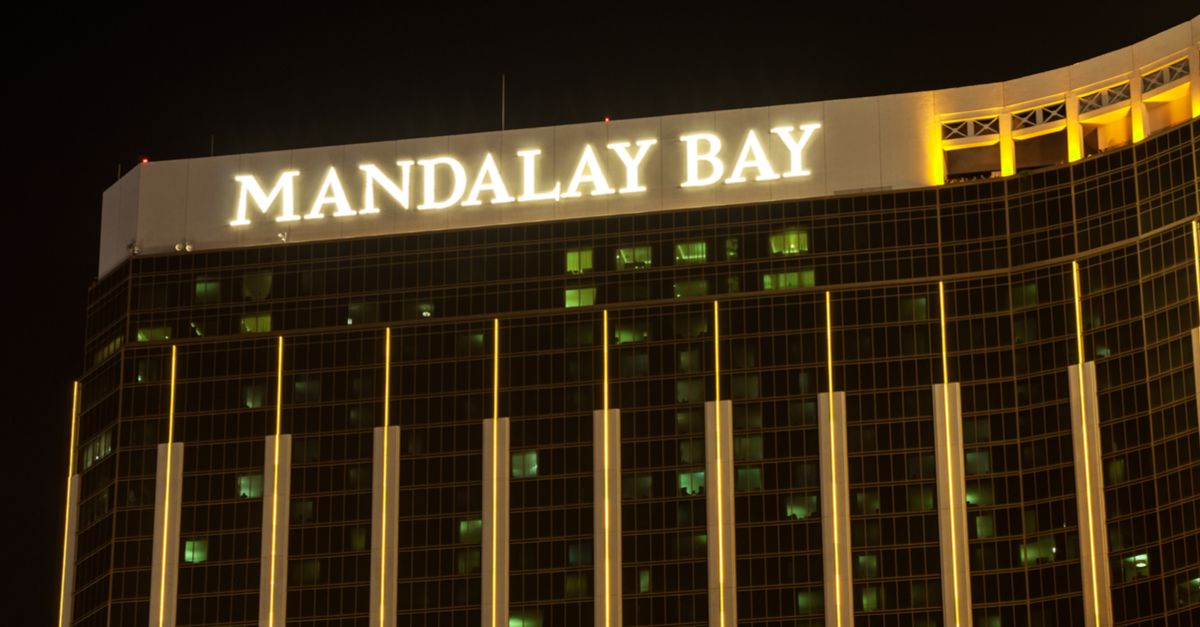Late in the evening of 1 October 2017, during the annual Route 91 Harvest country musical festival held on the Las Vegas Strip, a man later identified as 64-year-old Stephen Paddock indiscriminately opened fire on concertgoers from his hotel room on the 32nd floor of the Mandalay Bay hotel, killing more than fifty people and injuring hundreds more. With the official casualty list far from finalized, the tragedy has already become the deadliest mass shooting in United States history.
Prior to police identifying Paddock, who they believe killed himself before anyone reached him in his hotel room, the Islamic State claimed responsibility for the attack through their media outlet Amaq. Amaq’s "reporting" suggested, with no supporting evidence, that the perpetrator (whom they referred to not by Paddock’s actual name, but his alleged Islamic name, "Abu Abd al-Bar al-Ameriki") was acting on behalf of their interests. CBS News reported:
The terror group said in a pair of statements released by its pseudo-news agency Amaq, citing anonymous sources, that the gunman, identified by police as 64-year-old Stephen Paddock, converted to Islam several months ago and carried out the attack, "in response to calls to target states of the coalition" battling ISIS.
The claim — which the FBI believes has no merit — is an odd one for Amaq, which until recently has not been known for making false claims related to Islamic State-linked terror attacks. An NPR story from May 2017 had this to say about ISIS and Amaq’s claims of responsibility:
ISIS, which sees itself as a state, has its own news outlet — Amaq News Agency. It "purports to be independent" but is actually an ISIS propaganda arm, said Thomas Joscelyn, senior editor of the counterterrorism publication The Long War Journal. [...] Reporters can be fairly confident the claims come from ISIS, because the extremist group has been very conscious of controlling and spreading its message.
"We have not been able to find a real lie from ISIS," said [Rita Katz, the director of the SITE Intelligence Group], who follows the group's social media obsessively with a critical eye. "Despite the fact that they are a terrorist organization, they want to provide their followers and supporters with authentic information."
Joscelyn said he can't think of an example of an outright false claim by ISIS in the U.S. and western Europe. There are plenty of exaggerations — on death tolls, for instance — and the statements shouldn't be assumed to be true.
The Atlantic's Graeme Wood concurred with this view in a response to the claim of responsibility:
The idea that the Islamic State simply scans the news in search of mass killings, then sends out press releases in hope of stealing glory, is false. Amaq may learn details of the attacks from mainstream media — and often gets those details wrong, also like mainstream media — but its claim of credit typically flows from an Amaq-specific source.
However, the Las Vegas claim of responsibility appears to be completely without basis. Two senior U.S. government officials told Reuters that Paddock’s name was not on any database of suspected terrorists. Aaron Rouse, special agent in charge of the Federal Bureau of Investigation's field office in Las Vegas, told reporters that the FBI "have determined to this point no connection with any international terror group."
Some terrorism experts have noted that since June 2017, there appears to have been in uptick in demonstrably false claims stemming from Amaq. In a Twitter thread posted on 2 October 2017, CNN terrorism analyst Paul Cruickshank pointed to two previous claims made by ISIS since June 2017 that turned have turned out to be completely false:
1. ISIS in recent months has made a number of demonstrably false claims for attacks and incidents that had no jihadi terror nexus.
2. Exhibit A of a false ISIS claim was their claim for attack on Manila, Philippines casino resort in June. Perpetrator was indebted gambler.
3. Exhibit B of a false ISIS claim was their claim to have smuggled explosives into [Charles De Gaulle] airport in Paris last month.
4. In actual fact the [Charles De Gaulle] security alert was caused by verbal threats by an angry female passenger in her 50s not allowed onto flight.
5. Conclusion: ISIS, desperate for attention, will claim just about anything these days knowing their supporters won't believe govt/media.
Speaking to CNBC, Colin Clarke, a Pittsburgh-based political scientist and terrorism expert for Rand Corporation, concurred with Cruickshank’s purported motive — that the Islamic State, suffering heavy territorial losses, has a lot in common with every garden-variety Internet troll:
It seems like they're desperate for attention and will claim just about everything [...]. They've lost so much territory, and they fear they're becoming irrelevant.
In that same report, Jasmine El-Gamal, a Beirut-based senior fellow at the Atlantic Council, similarly tied IS's increased need for Internet recognition to their territorial losses:
We've seen them over the last year, as they start to lose territory, in Raqqa and Mosul, turn more and more towards internet radicalization, trying to claim credit for lone-wolf attacks.
A number of outlets have speculated that the reason for the rapid claim of responsibility stems from the fact that the Islamic State reportedly called for lone wolf attacks against Las Vegas — a discovery found on a propaganda video first reported on in May 2017 that superficially suggests a link. Despite this claim, there remains no evidence that Paddock had any connection to IS or any other terrorist group.
As The Atlantic argued:
For now, the only evidence that the Islamic State was involved is its own assurance.
This assurance, as many have noted, appears to be one whose credibility has been declining precipitously.
